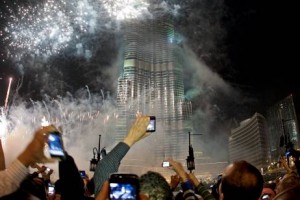By Eugene Harnan , Wafa Issa and Carol Huang www.thenational.ae
DUBAI // At the stroke of midnight last December 31, an estimated 600,000 New Year revellers watched in awe as the Burj Khalifa put on the world’s highest pyrotechnic display. Many, however, were watching through their car windows.

The clogged roads and jammed Metro stations that night have become as discussed as the three-minute fireworks display itself. Passengers reported scenes of chaos at some Metro stops as long queues snaked through stations, with people stranded for hours waiting for space on a train. Traffic ground to a standstill on roads around the 828-metre tower, with some people choosing to walk home along Sheikh Zayed Road rather than spend hours in jams.
Tomorrow, Emaar Properties, the Burj Khalifa’s development company, is expecting even more visitors to what has become the focal point for Dubai’s New Year’s Eve festivities. With government bodies highlighting the event as integral to securing Dubai’s position as a “global hub for events”, authorities are aiming for as smooth a night as possible.
Emaar itself is urging people to arrive before 10pm, and said it has coordinated with bodies including the Roads and Transport Authority (RTA) and Dubai Police to prepare for the crowds. A spokesperson for the company said the plans would help ensure “the celebrations can be enjoyed by the visitors seamlessly”.
According to Dubai Police, a key problem last year was that too many people poured into such areas as Burj Park, an island overlooking the Burj Khalifa site that had capacity for just 15,000 people.
“No special arrangements were made to deal with the overflow of people,” said Brigadier Abdullah Al Gaithi of the Dubai Police, who is deputy head of a committee that handles security for events in the emirate. “This year hopefully things will be different, and we have put in place a plan where more than 500,000 people can very easily visit the venue and enjoy the celebrations.”
Once people reach the site, they have the choice of gathering at Burj Park or other areas including the Waterfront Promenade near Dubai Mall, Burj Plaza, The Pavilion art centre and lounge, and Emaar Boulevard.
In terms of road management, the police will split the roads leading to the Burj Khalifa into lanes designated for private vehicles, buses and taxis, and for emergency vehicles. There will be added traffic patrols on major roads in central Dubai, such as Sheikh Zayed Road. Last year the Defence roundabout was among the worst affected areas.
“If we start seeing that the main areas are becoming overcrowded we will close the roads leading to the Boulevard and direct the people to alternative places,” said Brig Al Gaithi. “I hope the public will be cooperative and follow the orders of the police and understand that we are there to organise the event so they can enjoy the festivity.”
For pedestrians, there will be one entry gate into the tower’s fountain area and two exit gates in a bid to streamline the flow of visitors.
Four sand lots surrounding the tower have been levelled and provided with water dispensers for standing spectators. In addition, four police kiosks will be set up where people can report missing belongings or deliver found items. Officers will also distribute wristbands to children and ask parents to write their mobile numbers on them should they get separated.
“Last year many children were lost and we had to take them in the police stations and wait until their parents asked for them,” said Brig Al Gaithi.
Tens of thousands of people are expected to arrive at the site by Metro, taxi or bus. Last year, some people waited more than an hour to get a train home before giving up and walking.
The RTA said there will be a continuous Metro service from 5.50am on Saturday until midnight on Sunday. After midnight, trains will run every three minutes until 5.30am. The Burj Khalifa station will have a separate entry and exit point, and gates at the station have been widened. Those coming by train will have to use No1 cards or buy tickets ahead of time to keep the crowds moving. More info
















